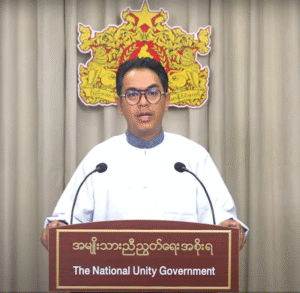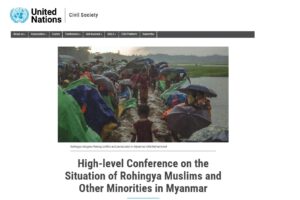Translated the FB post by Kaung Kin Ko, Myanmar-born writer based in Thailand.
Recently, on occasions like Daw Aung San Suu Kyi’s birthday, I haven’t been as active as before. Yet in my heart, I still love and respect her. So why am I not as vocal?
In my account, I have friends of many ethnicities, religions, and political leanings. Among them are Rakhine friends who suffered when the military bombed their villages during Daw Suu’s government, and who were hurt by some of her statements. There are Muslims who had to pay nearly twenty lakhs just to get a passport under her administration. There were students and activists who became fugitives during her term.
If I openly celebrate her now, those friends in my circle will feel pain. If I post with love for her, I must also consider how others will feel. For example—imagine today, if the Prime Minister of Malaysia or the President of Vietnam publicly said: “Min Aung Hlaing is not really killing people.” How outraged would we Burmese be? That is how many Rohingya felt when Daw Suu spoke in ways that dismissed their suffering.
Now, millions of Bamar are fleeing. In the past, hundreds of thousands of Rohingya fled. When they said they ran because of killings, many doubted them: “If killings happened, why didn’t all leave?” The same logic could now be turned on fleeing Bamars: “If Min Aung Hlaing is really killing, why are some not fleeing?” If outsiders asked us that, we would be outraged. Daw Suu once asked such questions about the Rohingya.
So for me, respect and love for Daw Suu is one part. Understanding the pain of others is another. If I post too actively, friends may comment: “But your Daw Suu did this.” They wouldn’t be wrong. I would then feel responsible, having to explain, defend, and mediate disputes on my own page. That’s why I am quiet.
Why don’t I criticize her either? Because:
- She never had full authority, even in government. Some of her statements may have been personal missteps, but real power wasn’t in her hands.
- She genuinely cared for the majority of Myanmar people, though sadly at the expense of some minorities.
- She is now imprisoned.
In my view, there’s little point in criticizing her after 2021. I myself did criticize many issues during her government, but now—criticism is useless.
If I show love for her, it’s obvious I still do. I even wrote poems for her long ago. But since 2012 I’ve refrained from sharing them, because there are people who would feel deep pain seeing Daw Suu idolized. On the other hand, I dislike overly harsh, insulting words against her. Politicians will always face critics; and in her case, she made grave mistakes of compassion. But still, most of the people continue to love and respect her, and when they celebrate her birthday, I share their joy.
For myself, though, with a diverse group of friends, I have to be careful. I don’t want her birthday to become a cause of quarrels among my friends. And I don’t want to bear responsibility for that.
It also makes me reflect on people more broadly. Everywhere in the world, not only in Myanmar, people feel pain only when their own group suffers. When others suffer, they are indifferent—or worse, complicit. Some even rejoice when others fall. That is human weakness, not unique to Myanmar.
And on social media, if you voice uncomfortable truths, you will be attacked. Sometimes, even if you defend a group when they are oppressed, later when they become the oppressors, and you speak for their victims, they will turn on you. That is the nature of social media. And because much of it is subjective, even when you think you are right, you may not be; and vice versa.
That’s why I have come to believe: Myanmar social media is best used for light sharing, not heavy politics. Otherwise, better to be like a bird that cannot sing.
About the Author: Kaung Kin Ko is a Myanmar-born Freethinker (Hindu/Buddhist) writer currently based in Thailand. Known for his thoughtful and justice-oriented essays, he often reflects on Myanmar’s history, politics, and interfaith relations. His work emphasizes fairness, empathy, and truth-seeking across communities.






